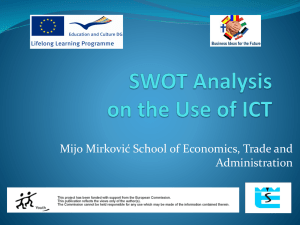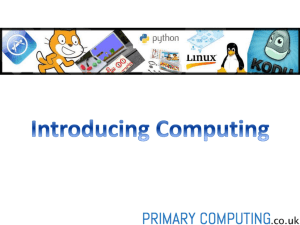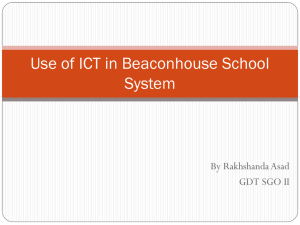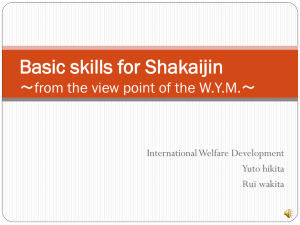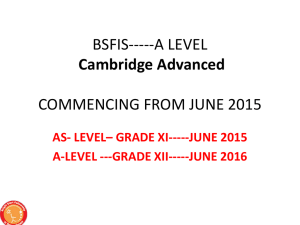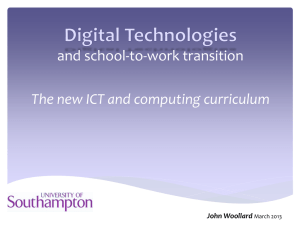Test - Cambridge Nationals
advertisement
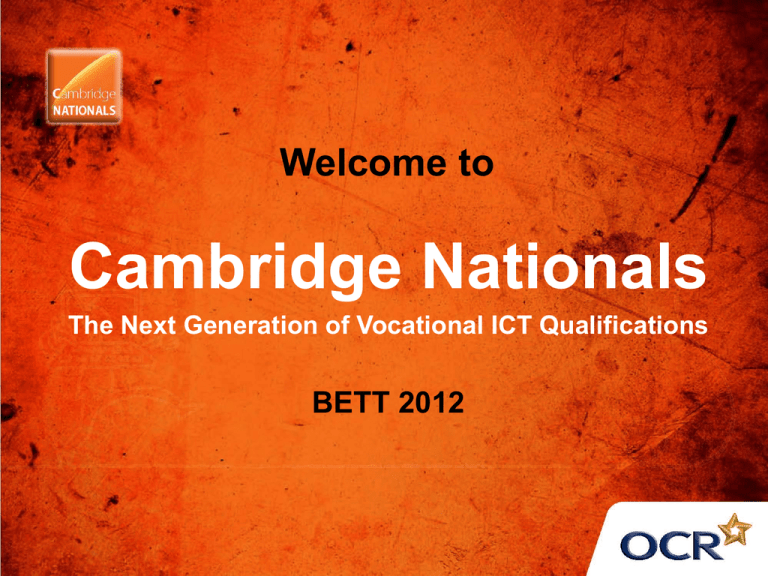
Welcome to Cambridge Nationals The Next Generation of Vocational ICT Qualifications BETT 2012 Mark Dawe OCR Chief Executive Cambridge Nationals Introducing: The Next Generation of Vocational Qualifications Cambridge Nationals • Vocational revolution: embracing a new challenge Post Wolf • Importance of a balanced curriculum in schools • Traditional GCSEs and subject-based learning do not suit all learners equally • Many learners motivated by practical, experiential approach to learning Cambridge Nationals The new name for OCR Nationals • We have redeveloped the Nationals in response to Wolf, and in close collaboration with leading practitioners • Designed for 14 – 16 years olds, and to meet new DfE requirements • Cambridge Nationals available in five subjects: ICT, Business, Health & Social Care, Science and Sport • The Cambridge Nationals suit a wide range of learning styles and abilities and offer experiential learning A new suite of vocational qualifications for post 16 • Cambridge TECs available at Levels 2 & 3 • Subjects: – IT, Business, Health & Social Care have been accredited – Art & Design, Media and Sport in development • Designed using units from the QCF • Features visiting moderation • Full launch March / April, first teaching September 2012 Cambridge Nationals Briefing Session: Agenda Overview of the changes Simon Banks, OCR Content Highlights Creative Unit: Tony Stephens Technical Unit: Chris Swan Project Unit: Jane Strugnell Short break Case Study Success with the Nationals at Brooke Weston Mark Willimott Panel Discussion Questions to our speaking panel Simon Banks OCR Qualifications Group Manager, ICT How has our review post Wolf affected the Nationals in ICT? We have: • Introduced external assessment • Established qualifications at 60, 120 & 240 glh • Retained visiting moderator visits • Streamlined the number of units • Combined Levels 1 & 2 How has our review post Wolf affected the Nationals in ICT? We have: • Added a Distinction* to reward highest achievers • Reduced subjectivity of marking by providing clear markband descriptors and guidance on allocation of marks • Retained ‘best fit’ assessment principles As a result, we have • Introduced compensation – you could fail an individual unit but still pass the overall qualification Within schools qualifications, what makes the Cambridge Nationals distinctive? • Strong vocational and career focus • Learning by doing – focus on practical, experiential learning – candidates feel direct relationship between what they study and a career to which they aspire • Full unit coverage - Units written with awareness of NOS and job role competencies, prescribing range of what must be demonstrated in the assessment Within schools qualifications, what makes the Cambridge Nationals distinctive? • Range of specialisms – allows candidates to explore areas of interest in detail • Enable learning and assessment to be customised easily • No restriction on resits • No linearisation, and no terminal rule. Content Highlights Creative Strand Tony Stephens Assistant Head Teacher, The Westwood Academy The Westwood Academy Coventry Tony Stephens About me – • Teaching ICT for a number of years • Head of ICT in three schools • Presently Assistant Head teacher responsible for e-learning and ICT Three Creative Units • Creating an interactive product using multimedia components • Creating dynamic products using sound and vision • Creating digital images Benefits Transferable Skills • • • • The Design Process Planning Methodologies The Law and Legal Implications File Saving, Exporting and Naming Conventions • Testing & reviewing • Gaining feedback and critical self evaluation Creating an interactive product using multimedia components • • • • • • • • • Sourcing and storing Assets Web Authoring Game Making App Development Presentation software Combining assets Creating Navigation Creating Interaction Using Effects Creating dynamic products using sound and vision • Asset Editing – Sound – Animation – Movie • Asset Enhancement • Combining Assets Creating digital images The camera never lies or does it……. 1917 we had the Cottingley Fairies Today we have photo manipulation of models and scenes What can today’s students do……where would they like to go that they have never been before! Benefits • Gives a wide scope of creation in terms of software and criteria • Can use freeware as well as commercial industrial standard software thus not restricting schools choice of units based on budget • Allows both students and teacher to be challenged (if they want to be!) Excited!! • That’s Me!!!! • Why? Because I can expand the areas that interest my pupils – App creation – Digital manipulation – Animation – Game creation • But I also become the pupil! Technical Strand Christine Swan Director of ICT and Enterprise The Stourport High School and Sixth Form Centre The Stourport High School and Sixth Form Centre About SHS • 11-18 Academy and National Teaching School with over 1300 students • OCR Nationals in ICT delivered in Year 9 (First Award) • Year 10 and 11 students can opt to build up their qualification to National Certificate Introducing the new Nationals • Consultation revealed what teachers liked and did not like about the current qualification • Content has been updated to provide pathways made up of complementary modules • Emphasis is placed on current and future technologies The new technical strand • This strand gives learners an opportunity to get to grips with technical aspects of IT • The units provide “tasters” of programming, hardware and networks and control systems • Each unit provides opportunity for progression to further study but also may spark an interest as a possible career path • Links to Computing curriculum The new technical strand The Technical Strand • Consists of three modules: – Introduction to Computer Programming – Exploring Computer Hardware and Networks – Developing Control Systems Introduction to Computer Programming • Proprietary or Open Source products can be used e.g. Microsoft’s Small Basic, Visual Basic and Kodu Game Lab or Scratch, Alice • Straightforward programming constructs can be taught through problem-solving challenges • Extension ideas could be app and game programming (although some app development kits are expensive) Exploring Computer Hardware and Networks • Bits and pieces can be collected to build “dead” computers (working with live systems can be costly and has safety implications) • Old, live computers can be used for operating system installation and configuration • Simple networks can be built using hubs, switches, cables or wireless access points • There will be problems which provide opportunities for troubleshooting Developing Control Systems • Systems used at KS3 e.g. Flowol and Logo can be used to simulate control systems • Hardware systems e.g. Lego Mindstorms, Robosapien with XNA Development Studio or development boards with sensors and output devices • There is no requirement to build working hardware systems but this could provide a curricular link to a GCSE D&T programme Why I will be choosing the Cambridge Nationals in ICT • Wolf compliant qualification • Content is current, exciting and varied • A L1/2 qualification is suitable for a broad range of learners • Allows learners to develop in-demand, technical skills • Provides a great launch-pad for level 3 study Unit 11 Understanding Technology A Project Approach Jane Strugnell Consultant Trainer & Assessor Jane Strugnell • Recently retired teacher and Curriculum Leader (Computing & IT) from Solihull Sixth Form College • Has taught GCE ICT, GNVQ ICT, AVCE ICT, Key skills ICT, Functional skills ICT, BTEC ICT, Advanced ICT Diploma & Extended Project Qualification • Unit writer for two units for the Cambridge Nationals qualification • Currently a Senior Examiner and Moderator for two awarding bodies • Currently delivers CPD courses on A level IT specifications at schools & colleges Student initiated individual project • • • • • • • Opportunity Choice Breadth Depth Transferable skills Inspire Motivate Project Ideas Creative • Web site design for a specific user • Complex animation for school intranet Project Ideas Technical (Hardware) • What is the best way to network 3 PC’s and a printer for a typical family? • How does the School IT Network work? Project Ideas Hypothesis • Most of the features of the latest mobile phones are never used • Use of social networking sites such as Facebook is damaging young people’s ability to communicate effectively. Project Ideas Analytical • What are the benefits of a Smartphone compared to a standard mobile phone? • How has Computer Technology changed the Art of Film Making? Project Ideas Knowledge • Artificial Intelligence – what progress has been made? • Careers in IT – what skills are needed to be a Network Manager? Project Ideas Software Development • Development of a computer program to calculate exam grades • Development of a database – a loan system for a school department Process v Outcome • Process of completing the project is important • Outcome of the project itself is not marked • The learning gained as a result of carrying out the project is important • There is freedom for the learner to choose the way they present their Project log & Project outcome What teaching is required? • How to choose a Project topic ,set objectives, identify success criteria & techniques to create project plans • How to conduct research for their Project • How to record and monitor the progress of their Project • How to review their Project Why teach this qualification? Opportunity Choice Breadth Depth Skills Inspire Motivate Short Break Please explore Project further Find out about brand new support materials from Hodder Brooke Weston Academy Our experience of ICT Nationals Mark Willimott Brooke Weston Academy OfSTED January 2011 “Excellent workplace and other skills that contribute to the students’ future economic well-being are delivered through the academy’s outstanding curriculum which puts innovation and enterprise into the heart of the provision” “The excellent, broad and balanced curriculum meets the wide range of students’ needs and aspirations” Brooke Weston’s Track Record Long tradition of delivering KS4 and Post-16 applied courses 2004+ 100% 5 A* - C (including equivalencies) 2011 84% EM +3 (including equivalencies) 84% EM +3 (GCSE only) Sharing expertise with 250+ schools across UK – curriculum materials, support, training, consultancy Intake Distribution <70 70-80 7 11 80-90 18 90-100 36 100-110 110-120 120-130 130-140 140+ 56 36 18 11 7 Our KS4 Curriculum KS4 offering: • Traditional GCSE courses (27) with additional time in maths and English • Fast track opportunities and personalisation • Applied courses (ICT, science, art and design) • Construction option (off-site) • IMI Motor Vehicle (off-site) ICT Nationals @ BW • Transferable skills • Relevant skills • GCSE/A Level equivalence • Modular, staged courses • Challenge for all learners ICT Nationals @ BW • Creativity • Engaging and motivating • Playing to their strengths • Hands-on approach • Develops independence Forms of Evidence • Outcomes of activities/tasks e.g. printouts • Video/Audio • Electronic file • Statements from witnesses • Observation • Personal statement by candidate • ePortfolio New Qualification Unit R005: Creating an interactive product using multimedia components • Website or multimedia product (adapting our assignments from current Unit 2 and 4) • Currently most popular units with our students in current qualification LO1 - be able to design interactive products LO2 – be able to create interactive products containing multimedia components LO3 – be able to carry out usability testing Link to R006 – Creating digital images • LO2 – be able to create digital images • Link to R007 – Creating dynamic products using sound and vision • LO2 – be able to create dynamic products Our plans for the new Specification • Year 1 – deliver 120 GLH qualification • ROO1 and R002 • ROO5 – Interactive Product • ROO6 – Digital Images • Year 2+ – deliver 240 GLH qualification • ROO1 and ROO2 • R005 and R006 • R003 (spreadsheets) and R004 (databases) • R007 (sound and vision) • R011 (project) Questions to our Panel Thank you To find out more please visit www.cambridgenationals.org.uk Draft ICT Specification now online




